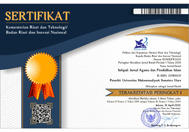Developing An Impactful Strategy For Religious Education: Understanding Student Perspectives And Experiences
Abstract
Adopting religious learning methods that cater to student diversity is increasingly crucial in today's education landscape, particularly in light of technology's role in fostering personalized and interactive learning environments. This research delves into the significance of employing differentiated religious learning approaches and fostering meaningful interactions between educators and students within Islamic religious universities. The study relies on a qualitative approach, including group interviews with students. The findings reveal student perspectives on learning techniques and assigned tasks. While some students express disengagement and reduced motivation with repetitive learning methods, others gravitate toward practical and interactive approaches. Effective teacher-student interaction emerges as pivotal, emphasizing teachers' ability to actively listen, offer constructive feedback, and cultivate a supportive atmosphere. Challenges in engaging with educators encompass unresponsiveness to student inquiries and the use of complex language. An excessive workload, particularly with tight deadlines, also proves burdensome for students. Nevertheless, students positively view technology-related assignments, hands-on experiences, and societal issues.
Keywords
Full Text:
PDFReferences
ADALI, E. A., & Çağlar, A. (2023). Group decision making in best-worst method when the best and worst are not unique: case study of scholar selection. Pamukkale Üniversitesi Mühendislik Bilimleri Dergisi, 29(1), 30–44.
Adeoye‐Olatunde, O. A., & Olenik, N. L. (2021). Research and scholarly methods: Semi‐structured interviews. Journal of the American College of Clinical Pharmacy, 4(10), 1358–1367.
Allen, K.-A., Slaten, C. D., Arslan, G., Roffey, S., Craig, H., & Vella-Brodrick, D. A. (2021). School belonging: The importance of student and teacher relationships. In The Palgrave handbook of positive education (pp. 525–550). Springer International Publishing Cham.
Aziz, R., Maksum, A., Atmoko, A., & Nashori, F. (2023). Lecturer Strategies for Developing Student Creativity in Higher Education. 4th Annual International Conference on Language, Literature and Media (AICOLLIM 2022), 483–495.
Bedenlier, S., Bond, M., Buntins, K., Zawacki-Richter, O., & Kerres, M. (2020). Facilitating student engagement through educational technology in higher education: A systematic review in the field of arts and humanities. Australasian Journal of Educational Technology, 36(4), 126–150.
Buerkle, A., O’Dell, A., Matharu, H., Buerkle, L., & Ferreira, P. (2023). Recommendations to align higher education teaching with the UN sustainability goals – A scoping survey. International Journal of Educational Research Open, 5(April), 100280. https://doi.org/10.1016/j.ijedro.2023.100280
Bulturbayevich, M. B., Rahmat, A., & Murodullayevich, M. N. (2021). Improving Teacher-Student Collaboration And Educational Effectiveness By Overcoming Learning Challenges. Aksara: Jurnal Ilmu Pendidikan Nonformal, 7(1), 153–160.
Conner, J., Mitra, D. L., Holquist, S. E., Rosado, E., Wilson, C., & Wright, N. L. (2024). The pedagogical foundations of student voice practices: The role of relationships, differentiation, and choice in supporting student voice practices in high school classrooms. Teaching and Teacher Education, 142(February 2023), 104540. https://doi.org/10.1016/j.tate.2024.104540
Cutroni, L., & Paladino, A. (2023). Peer-ing in: A systematic review and framework of peer review of teaching in higher education. Teaching and Teacher Education, 133(March), 104302. https://doi.org/10.1016/j.tate.2023.104302
Damni, A. (2022). Forum Keagamaan sebagai Identitas, Multikulturalisme dan Peran Perempuan dalam Moderasi Beragama: Studi Fenomenologi Agama BKMT Kabupaten Kerinci. Prosiding Konferensi Gender Dan Gerakan Sosial, 1(01), 536–544.
Dorfberger, S., & Eyal, M. (2023). The perception and attitude of educators regarding differentiated teaching in elementary and junior high schools. Social Sciences and Humanities Open, 8(1), 100586. https://doi.org/10.1016/j.ssaho.2023.100586
Edwards, R., & Holland, J. (2020). Reviewing challenges and the future for qualitative interviewing. International Journal of Social Research Methodology, 23(5), 581–592.
Elfianti, M., Ferry, D., & Damni, A. (2023). Deciphering the student dilemma: The quest for passion and purpose on addmision of tadris biology department a religious higher education institutions. Jurnal Pijar Mipa, 18(6), 904–912.
Eloff, I., O’Neil, S., & Kanengoni, H. (2023). Students’ well-being in tertiary environments: insights into the (unrecognised) role of lecturers. Teaching in Higher Education, 28(7), 1777–1797.
Estrada, F. J. P., García-Prieto, F. J., & Conde-Vélez, S. (2020). Learning styles in university students: Types of strategies, materials, supports, evaluation and performance. Case Study. European Journal of Contemporary Education, 9(2), 394–409.
Fadila, T. K., & Damni, A. (2023). Intersection of Animated Films, Religious Education, and Parenting: A Phenomenological Study. ThufuLA: Jurnal Inovasi Pendidikan Guru Raudhatul Athfal, 11(1), 1–20.
Fransiska Faberta, K. S., Sukarno, & Murwaningsih, T. (2023). The New Paradigm of Merdeka Curriculum: Implementation of Pancasila Education Subject in Elementary School. International Journal of Elementary Education, 7(1), 79–88. https://doi.org/10.23887/ijee.v7i1.54092
Frenzel, A. C., Daniels, L., & Burić, I. (2021). Teacher emotions in the classroom and their implications for students. Educational Psychologist, 56(4), 250–264.
Gheyssens, E., Coubergs, C., Griful-Freixenet, J., Engels, N., & Struyven, K. (2022). Differentiated instruction: the diversity of teachers’ philosophy and praxis to adapt teaching to students’ interests, readiness and learning profiles. International Journal of Inclusive Education, 26(14), 1383–1400.
Ginja, T. G., & Chen, X. (2020). Teacher Educators’ Perspectives and Experiences towards Differentiated Instruction. International Journal of Instruction, 13(4), 781–798.
Hajovsky, D. B., Chesnut, S. R., & Jensen, K. M. (2020). The role of teachers’ self-efficacy beliefs in the development of teacher-student relationships. Journal of School Psychology, 82, 141–158.
Haleem, A., Javaid, M., Qadri, M. A., & Suman, R. (2022). Understanding the role of digital technologies in education: A review. Sustainable Operations and Computers, 3, 275–285.
Karst, K., Bonefeld, M., Dotzel, S., Fehringer, B. C. O. F., & Steinwascher, M. (2022). Data-based differentiated instruction: The impact of standardized assessment and aligned teaching material on students’ reading comprehension. Learning and Instruction, 79, 101597. https://doi.org/10.1016/j.learninstruc.2022.101597
Kyngäs, H., Kääriäinen, M., & Elo, S. (2020). The trustworthiness of content analysis. The Application of Content Analysis in Nursing Science Research, 41–48.
Langelaan, B. N., Gaikhorst, L., Smets, W., & Oostdam, R. J. (2024). Differentiating instruction: Understanding the key elements for successful teacher preparation and development. Teaching and Teacher Education, 140(November 2023), 104464. https://doi.org/10.1016/j.tate.2023.104464
Longobardi, C., Settanni, M., Lin, S., & Fabris, M. A. (2021). Student–teacher relationship quality and prosocial behaviour: The mediating role of academic achievement and a positive attitude towards school. British Journal of Educational Psychology, 91(2), 547–562.
López-Hernández, A., Buckingham, L. R., & Strotmann, B. (2023). Enhancing learning-oriented assessment through co-teaching in higher education. Studies in Educational Evaluation, 79, 101307. https://doi.org/10.1016/j.stueduc.2023.101307
Moe, A., Frenzel, A. C., Au, L., & Taxer, J. L. (2021). Displayed enthusiasm attracts attention and improves recall. British Journal of Educational Psychology, 91(3), 911–927.
Muñoz, J. L. R., Ojeda, F. M., Jurado, D. L. A., Peña, P. F. P., Carranza, C. P. M., Berríos, H. Q., Molina, S. U., Farfan, A. R. M., Arias-Gonzáles, J. L., & Vasquez-Pauca, M. J. (2022). Systematic review of adaptive learning technology for learning in higher education. Eurasian Journal of Educational Research, 98(98), 221–233.
Nieminen, J. H., Tai, J., Boud, D., & Henderson, M. (2022). Student agency in feedback: beyond the individual. Assessment & Evaluation in Higher Education, 47(1), 95–108.
Noori, A. Q., Said, H., Nor, F. M., & Ghani, F. A. (2020). The relationship between university lecturers’ behaviour and students’ motivation. Universal Journal of Educational Research, 8(11), 15–22. https://doi.org/10.13189/ujer.2020.082303
Pontiara, P., Ferry, D., & Damni, A. (2023). Exploring Student Subjectivity in Perceiving Courses Content in the Biology Department at an Islamic Religious University:(Penelusuran Subyektivitas Persepsi Mahasiswa dalam Mencerna Materi Mata Kuliah Jurusan Biologi di Perguruan Tinggi Agama Islam). BIODIK, 9(4), 1–11.
Puzio, K., Colby, G. T., & Algeo-Nichols, D. (2020). Differentiated literacy instruction: Boondoggle or best practice? Review of Educational Research, 90(4), 459–498.
Rahmat, P. S. (2020). Paradigm of Future Education Navigating The Future : The New Paradigm Of Education.
Reis, S. M., & Renzulli, J. S. (2018). The five dimensions of differentiation. International Journal for Talent Development and Creativity, 6(1), 87–94.
Risdianti, T., Jamin, A., & Damni, A. (2024). Challenges and Rationality in Choosing the Islamic Education Major in Islamic-Based Higher Education. SALIHA: Jurnal Pendidikan & Agama Islam, 7(1), 48–63.
Roberts, J. L., & Inman, T. F. (2023). Strategies for differentiating instruction: Best practices for the classroom. Routledge.
Roberts, R. E. (2020). Qualitative Interview Questions: Guidance for Novice Researchers. Qualitative Report, 25(9).
Sanders, M. G. (2023). Not All Best Practices Result in Best Performances: Two Empirical Studies of Online Accounting Education. University of Missouri-Saint Louis.
Shamsuddin, N., & Kaur, J. (2020). Students’ Learning Style and Its Effect on Blended Learning, Does It Matter?. International Journal of Evaluation and Research in Education, 9(1), 195–202.
Singh, P., & Singh, M. P. (2021). The role of teachers in motivating students to learn.
Snijders, I., Wijnia, L., Rikers, R. M. J. P., & Loyens, S. M. M. (2020). Building bridges in higher education: Student-faculty relationship quality, student engagement, and student loyalty. International Journal of Educational Research, 100, 101538.
Soeharto, S., Subasi Singh, S., & Afriyanti, F. (2024). Associations between attitudes toward inclusive education and teaching for creativity for Indonesian pre-service teachers. Thinking Skills and Creativity, 51(July 2023), 101469. https://doi.org/10.1016/j.tsc.2024.101469
Stentiford, L., & Koutsouris, G. (2021). What are inclusive pedagogies in higher education? A systematic scoping review. Studies in Higher Education, 46(11), 2245–2261.
Tambak, S., Hamzah, H., Ahmad, M. Y., Siregar, E. L., Sukenti, D., Sabdin, M., & Rohimah, R. B. (2022). Discussion method accuracy in Islamic higher education: the influence of gender and teaching duration. Cakrawala Pendidikan: Jurnal Ilmiah Pendidikan, 41(2), 507–520.
Tomlinson, C. A., & Imbeau, M. B. (2023). Leading and managing a differentiated classroom. Ascd.
Trabalíková, J. (2022). Role of lecturer in the education of university teachers and the fulfilling of their educational needs. Trends and Competencies in Vocational Education, 257–277.
Tuma, F. (2021). The use of educational technology for interactive teaching in lectures. Annals of Medicine and Surgery, 62, 231–235.
Wanders, F. H. K., Dijkstra, A. B., Maslowski, R., & Van der Veen, I. (2020). The effect of teacher-student and student-student relationships on the societal involvement of students. Research Papers in Education, 35(3), 266–286.
Wardani, A. D., Gunawan, I., Kusumaningrum, D. E., Benty, D. D. N., Sumarsono, R. B., Nurabadi, A., & Handayani, L. (2020). Student learning motivation: a conceptual paper. 2nd Early Childhood and Primary Childhood Education (ECPE 2020), 275–278.
Wong, B., & Chiu, Y. L. T. (2020). University lecturers’ construction of the ‘ideal’ undergraduate student. Journal of Further and Higher Education, 44(1), 54–68. https://doi.org/10.1080/0309877X.2018.1504010
Wormeli, R. (2023). Differentiation: From planning to practice, grades 6-12. Routledge.
Yuen, S. Y., Leung, C. C. Y., & Wan, S. W.-Y. (2022). Teachers’ perceptions and practices of differentiated instruction: Cross-cultural validation of the differentiated instruction questionnaire in Hong Kong. International Journal of Educational Research, 115, 102044. https://doi.org/10.1016/j.ijer.2022.102044
Zufriani, Z., Pitriani, P., & Damni, A. (2022). Rasch analysis of student attributes: development and validation of scale to measure religious moderation. JPPI (Jurnal Penelitian Pendidikan Indonesia), 8(1), 187–195.
DOI: https://doi.org/10.30596/19850
Refbacks
- There are currently no refbacks.
Intiqad Jurnal Agama dan Pendidikan Islam is abstracting & indexing in the following databases:
View My StatsEditorial Address:
Faculty of Islamic Religion, Universitas Muhammadiyah Sumatera Utara. Jl. Mukhtar Basri No. 3 Medan 20238 Telp. (061) 6622400 ext. 27 dan 28 Fax. (061) 6625474. e-mail: intiqad@umsu.ac.id

_(1).png)
























